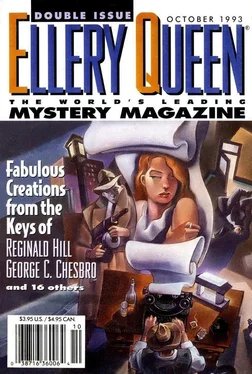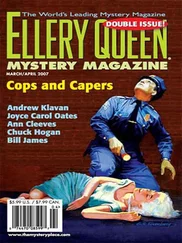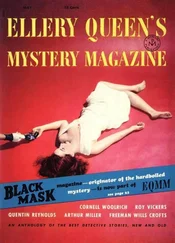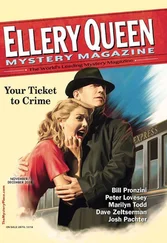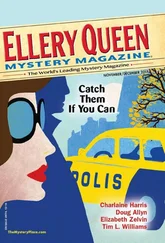Charles Ardai - Ellery Queen’s Mystery Magazine. Vol. 102, No. 4 & 5. Whole No. 618 & 619, October 1993
Здесь есть возможность читать онлайн «Charles Ardai - Ellery Queen’s Mystery Magazine. Vol. 102, No. 4 & 5. Whole No. 618 & 619, October 1993» весь текст электронной книги совершенно бесплатно (целиком полную версию без сокращений). В некоторых случаях можно слушать аудио, скачать через торрент в формате fb2 и присутствует краткое содержание. Город: New York, Год выпуска: 1993, Издательство: Davis Publications, Жанр: Детектив, на английском языке. Описание произведения, (предисловие) а так же отзывы посетителей доступны на портале библиотеки ЛибКат.
- Название:Ellery Queen’s Mystery Magazine. Vol. 102, No. 4 & 5. Whole No. 618 & 619, October 1993
- Автор:
- Издательство:Davis Publications
- Жанр:
- Год:1993
- Город:New York
- ISBN:нет данных
- Рейтинг книги:3 / 5. Голосов: 1
-
Избранное:Добавить в избранное
- Отзывы:
-
Ваша оценка:
- 60
- 1
- 2
- 3
- 4
- 5
Ellery Queen’s Mystery Magazine. Vol. 102, No. 4 & 5. Whole No. 618 & 619, October 1993: краткое содержание, описание и аннотация
Предлагаем к чтению аннотацию, описание, краткое содержание или предисловие (зависит от того, что написал сам автор книги «Ellery Queen’s Mystery Magazine. Vol. 102, No. 4 & 5. Whole No. 618 & 619, October 1993»). Если вы не нашли необходимую информацию о книге — напишите в комментариях, мы постараемся отыскать её.
Ellery Queen’s Mystery Magazine. Vol. 102, No. 4 & 5. Whole No. 618 & 619, October 1993 — читать онлайн бесплатно полную книгу (весь текст) целиком
Ниже представлен текст книги, разбитый по страницам. Система сохранения места последней прочитанной страницы, позволяет с удобством читать онлайн бесплатно книгу «Ellery Queen’s Mystery Magazine. Vol. 102, No. 4 & 5. Whole No. 618 & 619, October 1993», без необходимости каждый раз заново искать на чём Вы остановились. Поставьте закладку, и сможете в любой момент перейти на страницу, на которой закончили чтение.
Интервал:
Закладка:
It was time to look at that upper window. Through it was seen a four-post bed: a nurse or other servant in an armchair, evidently sound asleep; in the bed an old man lying: awake, and, one would say, anxious, from the way in which he shifted about and moved his fingers, beating tunes on the coverlet. Beyond the bed a door opened. Light was seen on the ceiling, and the lady came in: she set down her candle on a table, came to the fireside, and roused the nurse. In her hand she had an old-fashioned wine bottle, ready uncorked. The nurse took it, poured some of the contents into a little silver saucepan, added some spice and sugar from casters on the table, and set it to warm on the fire. Meanwhile the old man in the bed beckoned feebly to the lady, who came to him, smiling, took his wrist as if to feel his pulse, and bit her lip as if in consternation. He looked at her anxiously, and then pointed to the window, and spoke. She nodded, and did as the man below had done; opened the casement and listened — perhaps rather ostentatiously: then drew in her head and shook it, looking at the old man, who seemed to sigh.
By this time the posset on the fire was steaming, and the nurse poured it into a small two-handled silver bowl and brought it to the bedside. The old man seemed disinclined for it and was waving it away, but the lady and the nurse together bent over him and evidently pressed it upon him. He must have yielded, for they supported him into a sitting position, and put it to his lips. He drank most of it, in several draughts, and they laid him down. The lady left the room, smiling good night to him, and took the bowl, the bottle, and the silver saucepan with her. The nurse returned to the chair, and there was an interval of complete quiet.
Suddenly the old man started up in his bed — and he must have uttered some cry, for the nurse started out of her chair and made but one step of it to the bedside. He was a sad and terrible sight — flushed in the face, almost to blackness, the eyes glaring whitely, both hands clutching at his heart, foam at his lips.
For a moment the nurse left him, ran to the door, flung it wide open, and, one supposes, screamed aloud for help, then darted back to the bed and seemed to try feverishly to soothe him — to lay him down — anything. But as the lady, her husband, and several servants, rushed into the room with horrified faces, the old man collapsed under the nurse’s hands and lay back, and the features, contorted with agony and rage, relaxed slowly into calm.
A few moments later, lights showed out to the left of the house, and a coach with flambeaux drove up to the door. A white-wigged man in black got nimbly out and ran up the steps, carrying a small leather trunk-shaped box. He was met in the doorway by the man and his wife, she with her handkerchief clutched between her hands, he with a tragic face, but retaining his self-control. They led the newcomer into the dining room, where he set his box of papers on the table, and, turning to them, listened with a face of consternation at what they had to tell. He nodded his head again and again, threw out his hands slightly, declined, it seemed, offers of refreshment and lodging for the night, and within a few minutes came slowly down the steps, entering the coach and driving off the way he had come. As the man in blue watched him from the top of the steps, a smile not pleasant to see stole slowly over his fat white face. Darkness fell over the whole scene as the lights of the coach disappeared.
But Mr. Dillet remained sitting up in the bed: he had rightly guessed that there would be a sequel. The house front glimmered out again before long. But now there was a difference. The lights were in other windows, one at the top of the house, the other illuminating the range of coloured windows of the chapel. How he saw through these is not quite obvious, but he did. The interior was as carefully furnished as the rest of the establishment, with its minute red cushions on the desks, its Gothic stall-canopies, and its western gallery and pinnacled organ with gold pipes. On the centre of the black and white pavement was a bier: four tall candles burned at the corners. On the bier was a coffin covered with a pall of black velvet.
As he looked the folds of the pall stirred. It seemed to rise at one end: it slid downwards: it fell away, exposing the black coffin with its silver handles and nameplate. One of the tall candlesticks swayed and toppled over. Ask no more, but turn, as Mr. Dillet hastily did, and look in at the lighted window at the top of the house, where a boy and girl lay in two truckle beds, and a fourposter for the nurse rose above them. The nurse was not visible for the moment; but the father and mother were there, dressed now in mourning, but with very little sign of mourning in their demeanour. Indeed, they were laughing and talking with a good deal of animation, sometimes to each other, and sometimes throwing a remark to one or other of the children, and again laughing at the answers. Then the father was seen to go on tiptoe out of the room, taking with him as he went a white garment that hung on a peg near the door. He shut the door after him. A minute or two later it was slowly opened again, and a muffled head poked round it. A bent form of sinister shape stepped across to the truckle beds and suddenly stopped, threw up its arms, and revealed, of course, the father, laughing. The children were in agonies of terror, the boy with the bedclothes over his head, the girl throwing herself out of bed into her mother’s arms. Attempts at consolation followed — the parents took the children on their laps, patted them, picked up the white gown and showed there was no harm in it, and so forth; and at last, putting the children back into bed, left the room with encouraging waves of the hand. As they left it, the nurse came in, and soon the light died down.
Still Mr. Dillet watched, immovable.
A new sort of light — not of lamp or candle — a pale ugly light, began to dawn around the door-case at the back of the room. The door was opening again. The seer does not like to dwell upon what he saw entering the room: he says it might be described as a frog — the size of a man — but it had scanty white hair about its head. It was busy about the truckle beds, but not for long. The sound of cries — faint, as if coming out of a vast distance — but, even so, infinitely appalling, reached the ear.
There were signs of a hideous commotion all over the house: lights moved along and up, and doors opened and shut, and running figures passed within the windows. The clock in the stable turret tolled one, and darkness fell again.
It was only dispelled once more, to show the house front. At the bottom of the steps dark figures were drawn up in two lines, holding flaming torches. More dark figures came down the steps, bearing first one, then another small coffin. And the lines of torchbearers with the coffins between them moved silently onward to the left.
The hours of night passed on — never so slowly, Mr. Dillet thought. Gradually he sank down from sitting to lying in his bed — but he did not close an eye: and early next morning he sent for the doctor.
The doctor found him in a disquieting state of nerves, and recommended sea air. To a quiet place on the east coast he accordingly repaired by easy stages in his car.
One of the first people he met on the sea front was Mr. Chittenden, who, it appeared, had likewise been advised to take his wife away for a bit of a change.
Mr. Chittenden looked somewhat askance upon him when they met: and not without cause.
“Well, I don’t wonder at you being a bit upset, Mr. Dillet. What? Yes, well, I might say ’orrible upset, to be sure, seeing what me and my poor wife went through ourselves. But I put it to you, Mr. Dillet, one of two things: was I going to scrap a lovely piece like that on the one ’and, or was I going to tell customers, ‘I’m selling you a regular picture-palace-dramar in real life of the olden time, billed to perform regular at one o’clock A.M.’? Why, what would you ’ave said yourself? And next thing you know, two justices of the peace in the back parlour, and pore Mr. and Mrs. Chittenden off in a spring cart to the county asylum and everyone in the street saying, ‘Ah, I thought it ’ud come to that. Look at the way the man drank!’ — and me next door, or next door but one, to a total abstainer, as you know. Well, there was my position. What? Me ’ave it back in the shop? Well, what do you think? No, but I’ll tell you what I will do. You shall have your money back, bar the ten pound I paid for it, and you make what you can.”
Читать дальшеИнтервал:
Закладка:
Похожие книги на «Ellery Queen’s Mystery Magazine. Vol. 102, No. 4 & 5. Whole No. 618 & 619, October 1993»
Представляем Вашему вниманию похожие книги на «Ellery Queen’s Mystery Magazine. Vol. 102, No. 4 & 5. Whole No. 618 & 619, October 1993» списком для выбора. Мы отобрали схожую по названию и смыслу литературу в надежде предоставить читателям больше вариантов отыскать новые, интересные, ещё непрочитанные произведения.
Обсуждение, отзывы о книге «Ellery Queen’s Mystery Magazine. Vol. 102, No. 4 & 5. Whole No. 618 & 619, October 1993» и просто собственные мнения читателей. Оставьте ваши комментарии, напишите, что Вы думаете о произведении, его смысле или главных героях. Укажите что конкретно понравилось, а что нет, и почему Вы так считаете.
